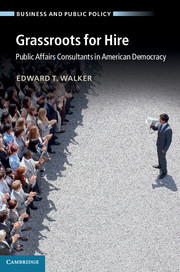Book contents
- Frontmatter
- Dedication
- Contents
- List of figures
- List of tables
- Acknowledgements
- Part I Sources
- Part II Structure
- 4 Methods for mobilizing the public
- 5 Corporate grassroots
- 6 Outsourcing advocacy? Consulting for associations
- Part III Outcomes
- Appendix 1 Identifying consulting firms (baseline data)
- Appendix 2
- Appendix 3
- Appendix 4
- Appendix 5
- Appendix 6 Models of consulting for non-trade associations
- Appendix 7 Models of consulting for trade associations
- Appendix 8 On public affairs consulting as a profession
- Bibliography
- Public documents referenced
- Index
6 - Outsourcing advocacy? Consulting for associations
Published online by Cambridge University Press: 05 June 2014
- Frontmatter
- Dedication
- Contents
- List of figures
- List of tables
- Acknowledgements
- Part I Sources
- Part II Structure
- 4 Methods for mobilizing the public
- 5 Corporate grassroots
- 6 Outsourcing advocacy? Consulting for associations
- Part III Outcomes
- Appendix 1 Identifying consulting firms (baseline data)
- Appendix 2
- Appendix 3
- Appendix 4
- Appendix 5
- Appendix 6 Models of consulting for non-trade associations
- Appendix 7 Models of consulting for trade associations
- Appendix 8 On public affairs consulting as a profession
- Bibliography
- Public documents referenced
- Index
Summary
Introduction
Public affairs consultants are quite logical service providers for corporations. After all, corporations are built for generating profits and distributing them to their owners or shareholders, not for mobilizing public participation. Thus, when a challenge like unwelcome regulation, a community controversy, and/or a public protest comes about, corporations often find that they need to enlist public affairs consultants’ services.
Advocacy organizations, by contrast, are known for their ability to connect people to politics. Public interest groups pressing for social change on issues like the environment and climate change, abortion, poverty, taxation, or health policy tend to be far more likely to have strong inherent capacities for galvanizing mass political participation than corporations do. Why, then, do some advocacy organizations feel the need to, in a sense, “outsource” their member mobilization efforts to public affairs consultants? And what does their doing so mean for the infrastructure of civic and political organizations in a context of expanding participatory inequality, transforming communications technologies, and professionalization in the advocacy sector?
- Type
- Chapter
- Information
- Grassroots for HirePublic Affairs Consultants in American Democracy, pp. 131 - 152Publisher: Cambridge University PressPrint publication year: 2014

